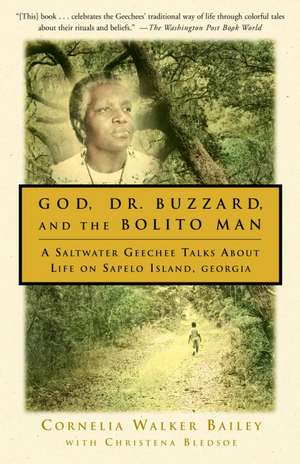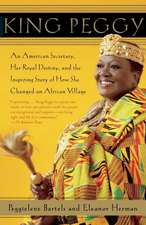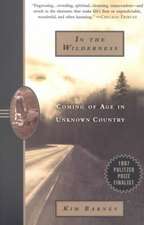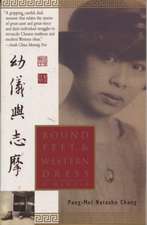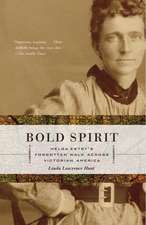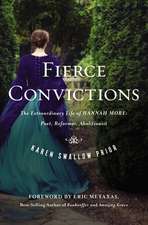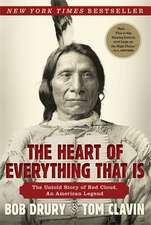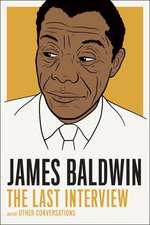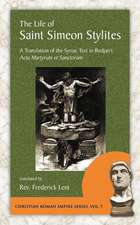God, Dr. Buzzard, and the Bolito Man: A Saltwater Geechee Talks about Life on Sapelo Island
Autor Cornelia Walker Bailey Christena Bledsoeen Limba Engleză Paperback – 30 iun 2001
Cornelia Walker Bailey models herself after the African griot, the tribal storytellers who keep the history of their people. Bailey’s people are the Geechee, whose cultural identity has been largely preserved due to the relative isolation of Sapelo, a barrier island off the coast of Georgia. In this rich account, Bailey captures the experience of growing up in an island community that counted the spirits of its departed among its members, relied on pride and ingenuity in the face of hardship, and taught her firsthand how best to reap the bounty of the marshes, woods and ocean that surrounded her. The power of this memoir to evoke the life of Sapelo Island is remarkable, and the history it preserves is invaluable.
Preț: 101.65 lei
Nou
Puncte Express: 152
Preț estimativ în valută:
19.46€ • 20.05$ • 16.43£
19.46€ • 20.05$ • 16.43£
Carte tipărită la comandă
Livrare economică 03-17 martie
Preluare comenzi: 021 569.72.76
Specificații
ISBN-13: 9780385493772
ISBN-10: 0385493770
Pagini: 368
Ilustrații: 8 PAGES OF B&W PHOTOS, 1 MAP (23 HALFTONES)
Dimensiuni: 130 x 203 x 18 mm
Greutate: 0.36 kg
Editura: Anchor Books
ISBN-10: 0385493770
Pagini: 368
Ilustrații: 8 PAGES OF B&W PHOTOS, 1 MAP (23 HALFTONES)
Dimensiuni: 130 x 203 x 18 mm
Greutate: 0.36 kg
Editura: Anchor Books
Notă biografică
Cornelia Walker Bailey’s family has lived on Sapelo Island since 1803. Christena Bledsoe lives in Atlanta and Cedar Key, Florida.
Extras
A Special Gift
Let me tell you how it was. A screech owl hooting at your door was a sure sign of death. A black cat wasn't
bad luck, it was good luck. And you never threw water out your door after dark. You might be throwing it on
your loved ones, the spirits of your loved ones who came to visit at night. If you just had to throw that water out, you'd stop first and say, "Excuse me, loved ones. Draw aside," and that gave them time to move out of the way.
Back in the 1940s when I was growing up, it was part of everyday life [over here on Sapelo Island] to believe in magic and signs and spirits. My family absolutely believed. That's right. The spirits were always in our lives. Always. People talked to the spirits and accused them of playing tricks and being full of mischief. Like when Mama would lose her glasses and she knew, just knew, she left them on the table.
She'd say, "Okay, Uncle Shed, I know you're in the house. I know you took my glasses. I know you' playin' a joke on me. Now put my glasses back. You put my glasses right back where you got them from." Uncle Shed was
Shadrach Hall, Mama's uncle on her mother's side, who was born in slavery times and lived to be more than one hundred years old. Mama would call on the spirit of Uncle Shed to put her glasses back and then she'd go and do her work and come back, and those glasses would be on the table right where she left them. All of a sudden, they'd reappear.
Some of us saw spirits too, me included, not all the time but sometimes. Of course, there's a reason why I saw them. The old people said I was singled out.
We were living at Belle Marsh, on the west side of Sapelo, on the North End, when I got singled out. There were five small black communities over here then, Belle Marsh, Raccoon Bluff, Lumber Landing, Shell Hammock and Hog Hammock.
Hog Hammock was already the biggest community and Belle Marsh was the smallest, but we all lived on land that had been in our families since shortly after the Civil War. When freedom came, our ancestors knew the only way to stand on their own two feet and feed their families was to have their own land. So as soon as they could, they bought land on the island they had worked the soil of during slavery days.
Belle Marsh was my family's own little world. Other than Papa's Uncle Nero, it was just Mama and Papa, my brother Gibb, my sisters Barbara and Ada, Ada's baby son Michael and my brother Asberry and me in the area known as Belle Marsh. That was it.
Anyway, one day when I was three years old, I got sick. Real sick. Up to that time, I was a regular little healthy child. Mama and Papa had gone shopping in Brunswick that day. They'd gotten up early that morning and
walked down to Marsh Landing at the southern tip of the island to catch the company boat. That was nine miles right there. Then they rode six and one-half miles over the water to Meridian Dock on "the other side," which is
what we all call the Georgia mainland. From there, it's another twenty-one miles south to Brunswick but luckily Mama and Papa got a ride. What I'm getting at though is that they were far away.
It was spring, a beautiful Saturday in May, late May, matter of fact, and back at Belle Marsh, my brother Asberry and I were playing in the sun. There was a pear tree near the house and there were tiny green pears on the pear tree that were looking good. Mama had told us not to eat them because they weren't ripe yet. But a kid's gonna do what a kid's gonna do, especially if your parents aren't around to catch you, so naturally we ate them. Asberry picked them. He was two years older than me, which made him five, so he could reach up and grab them and he gave me some. We had ourselves a good time eating those pears.
By the time Mama and Papa got back to the Marsh Landing Dock and walked home to Belle Marsh, it was almost dark. I wasn't feeling well by then and I got worse quick. That night, I had a fever, a very high fever, and no matter what Mama and Papa did, nothing brought the fever down.
We didn't have a doctor on the island, we never had and we still don't, so people took care of things themselves. They had to most times, absolutely had to, and Mama and Papa had to this time. They couldn't have gotten me to a hospital on the mainland because the company boat didn't run on Saturday night and it was the only way on and off the island.
Mama and Papa tried every remedy they could and nothing worked. There's a plant here we call the fever bush because you make a tea out of it to lower your temperature, but that bush isn't ready to pick until late summer, so they had to try something else.
Mama bathed me in tepid water and that didn't work so Papa went out and got some leaves from the beauty berry bush, another plant that grows over here. In the fall of the year, the beauty berry bush has clusters of
the most gorgeous bright purple berries and that's why it's called the beauty berry bush, but it's the leaves that you use and they're out in the spring. Mama crushed the leaves, mixed them with vinegar and slathered it
all over my body to make the fever go down. But that didn't work either.
Mama and Papa sat up all night with me. Nobody in the house went to bed that night. Nobody slept. They were all too scared for me to sleep. Mama was watching and praying the entire night because she knew my fate was in God's hands.
A little before daybreak, I died.
Let me tell you how it was. A screech owl hooting at your door was a sure sign of death. A black cat wasn't
bad luck, it was good luck. And you never threw water out your door after dark. You might be throwing it on
your loved ones, the spirits of your loved ones who came to visit at night. If you just had to throw that water out, you'd stop first and say, "Excuse me, loved ones. Draw aside," and that gave them time to move out of the way.
Back in the 1940s when I was growing up, it was part of everyday life [over here on Sapelo Island] to believe in magic and signs and spirits. My family absolutely believed. That's right. The spirits were always in our lives. Always. People talked to the spirits and accused them of playing tricks and being full of mischief. Like when Mama would lose her glasses and she knew, just knew, she left them on the table.
She'd say, "Okay, Uncle Shed, I know you're in the house. I know you took my glasses. I know you' playin' a joke on me. Now put my glasses back. You put my glasses right back where you got them from." Uncle Shed was
Shadrach Hall, Mama's uncle on her mother's side, who was born in slavery times and lived to be more than one hundred years old. Mama would call on the spirit of Uncle Shed to put her glasses back and then she'd go and do her work and come back, and those glasses would be on the table right where she left them. All of a sudden, they'd reappear.
Some of us saw spirits too, me included, not all the time but sometimes. Of course, there's a reason why I saw them. The old people said I was singled out.
We were living at Belle Marsh, on the west side of Sapelo, on the North End, when I got singled out. There were five small black communities over here then, Belle Marsh, Raccoon Bluff, Lumber Landing, Shell Hammock and Hog Hammock.
Hog Hammock was already the biggest community and Belle Marsh was the smallest, but we all lived on land that had been in our families since shortly after the Civil War. When freedom came, our ancestors knew the only way to stand on their own two feet and feed their families was to have their own land. So as soon as they could, they bought land on the island they had worked the soil of during slavery days.
Belle Marsh was my family's own little world. Other than Papa's Uncle Nero, it was just Mama and Papa, my brother Gibb, my sisters Barbara and Ada, Ada's baby son Michael and my brother Asberry and me in the area known as Belle Marsh. That was it.
Anyway, one day when I was three years old, I got sick. Real sick. Up to that time, I was a regular little healthy child. Mama and Papa had gone shopping in Brunswick that day. They'd gotten up early that morning and
walked down to Marsh Landing at the southern tip of the island to catch the company boat. That was nine miles right there. Then they rode six and one-half miles over the water to Meridian Dock on "the other side," which is
what we all call the Georgia mainland. From there, it's another twenty-one miles south to Brunswick but luckily Mama and Papa got a ride. What I'm getting at though is that they were far away.
It was spring, a beautiful Saturday in May, late May, matter of fact, and back at Belle Marsh, my brother Asberry and I were playing in the sun. There was a pear tree near the house and there were tiny green pears on the pear tree that were looking good. Mama had told us not to eat them because they weren't ripe yet. But a kid's gonna do what a kid's gonna do, especially if your parents aren't around to catch you, so naturally we ate them. Asberry picked them. He was two years older than me, which made him five, so he could reach up and grab them and he gave me some. We had ourselves a good time eating those pears.
By the time Mama and Papa got back to the Marsh Landing Dock and walked home to Belle Marsh, it was almost dark. I wasn't feeling well by then and I got worse quick. That night, I had a fever, a very high fever, and no matter what Mama and Papa did, nothing brought the fever down.
We didn't have a doctor on the island, we never had and we still don't, so people took care of things themselves. They had to most times, absolutely had to, and Mama and Papa had to this time. They couldn't have gotten me to a hospital on the mainland because the company boat didn't run on Saturday night and it was the only way on and off the island.
Mama and Papa tried every remedy they could and nothing worked. There's a plant here we call the fever bush because you make a tea out of it to lower your temperature, but that bush isn't ready to pick until late summer, so they had to try something else.
Mama bathed me in tepid water and that didn't work so Papa went out and got some leaves from the beauty berry bush, another plant that grows over here. In the fall of the year, the beauty berry bush has clusters of
the most gorgeous bright purple berries and that's why it's called the beauty berry bush, but it's the leaves that you use and they're out in the spring. Mama crushed the leaves, mixed them with vinegar and slathered it
all over my body to make the fever go down. But that didn't work either.
Mama and Papa sat up all night with me. Nobody in the house went to bed that night. Nobody slept. They were all too scared for me to sleep. Mama was watching and praying the entire night because she knew my fate was in God's hands.
A little before daybreak, I died.
Recenzii
“Delightful…. In writing that is both unadorned and poetic, Bailey’s soft, Southern wit shines through.”–Publishers Weekly
“A memorable read…. Highly recommended.”–Library Journal
